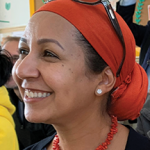Early childhood is the most important and sensitive time for human development. However, countries tend to under-invest in this stage of development, particularly in the Middle East and North Africa. Additionally, children may face unequal opportunities to grow and thrive based on their circumstances. This paper analyzes inequality of opportunity in early childhood development in twelve countries in the Middle East and North Africa, assessing development along a variety of dimensions and across the early lifecourse. We quantify inequality from in utero to age five in terms of health, nutrition, social-emotional development, early learning, and early work and decompose inequality into the shares related to different circumstances. The findings demonstrate that there is substantial inequality of opportunity starting early in life, and that inequality of opportunity is particularly high in early learning and in activities that support early cognitive development. A variety of circumstances impact early inequality, with wealth, mother’s education, and geographic differences all contributing substantially. Our analysis indicates that ensuring equality of opportunity in school and adult life will require redressing the causes of inequality of opportunity in early childhood.

Authors
Caroline Krafft
Associate Professor, Humphrey School of Public Affairs,...

Policy Affiliates
Safaa El-Kogali
Manager, Education Practice, Eastern and Southern Africa,...


